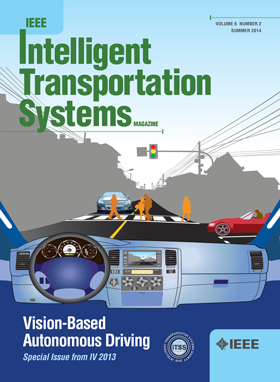评估室内行人空间的人群流量预测算法:使用合成数据集的基准
IF 8.4
1区 工程技术
Q1 ENGINEERING, CIVIL
IEEE Transactions on Intelligent Transportation Systems
Pub Date : 2025-04-16
DOI:10.1109/TITS.2025.3559353
引用次数: 0
摘要
人群管理在城市规划和应急响应中发挥着重要作用。准确的人群预测对于场馆经营者在大型集会期间有效应对不利的人群动态非常重要。尽管许多研究都试图用数据驱动的预测模型来预测人群密度或运动动态,但它们的验证通常仅限于同一场景中的数据。因此,由于收集关于紧急情况的分发外数据的挑战,数据驱动模型在疏散情景等不可见情景中的可预测性仍然未知。为了解决这个问题,我们提出了一个评估管道来评估不同类型的数据驱动模型。提出了一种通过模拟生成真实场景,并从这些场景中收集综合数据以获取综合数据集的方法。利用这些综合数据,我们评估了不同的预测模型,从传统的机器学习方法到深度学习时间序列预测模型,以探索它们的泛化性。此外,我们提出了一个加权平均指标,它更适合于在不利条件下确定预测算法的性能。通过广泛的实验,我们展示了模拟数据集的异质性和多样性。评估结果还显示,所有数据驱动的模型在未见场景中表现不佳,这突出表明迫切需要开发一种鲁棒且可推广的模型来预测室内空间的人群流动。本文章由计算机程序翻译,如有差异,请以英文原文为准。
Evaluating Crowd Flow Forecasting Algorithms for Indoor Pedestrian Spaces: A Benchmark Using a Synthetic Dataset
Crowd management plays a vital role in urban planning and emergency response. Accurate crowd prediction is important for venue operators to respond effectively to adverse crowd dynamics during large gatherings. Although many studies have tried to predict crowd densities or movement dynamics with data-driven predictive models, their validation is often limited to data within the same scenario. As a result, the predictability of the data-driven model in unseen scenarios, such as evacuation scenarios, remains unknown due to the challenges of collecting out-of-distribution data regarding emergency conditions. To address this problem, we present an evaluation pipeline to evaluate different kinds of data-driven models. A method is proposed to generate realistic scenarios by simulation and collect synthetic data from these scenarios to acquire a comprehensive dataset. With these synthetic data, we evaluated different predictive models, from traditional machine learning methods to deep learning time-series prediction models, to explore their generalizability. Furthermore, we propose a weighted average metric, which is better suited to determine the performance of forecasting algorithms under adverse conditions. Through extensive experimentation, we showcase the heterogeneity and diversity of the simulation dataset. The evaluation results also revealed that all the data-driven models performed poorly in unseen scenarios, highlighting the urgent need to develop a robust and generalizable model for predicting crowd flow in indoor spaces.
求助全文
通过发布文献求助,成功后即可免费获取论文全文。
去求助
来源期刊

IEEE Transactions on Intelligent Transportation Systems
工程技术-工程:电子与电气
CiteScore
14.80
自引率
12.90%
发文量
1872
审稿时长
7.5 months
期刊介绍:
The theoretical, experimental and operational aspects of electrical and electronics engineering and information technologies as applied to Intelligent Transportation Systems (ITS). Intelligent Transportation Systems are defined as those systems utilizing synergistic technologies and systems engineering concepts to develop and improve transportation systems of all kinds. The scope of this interdisciplinary activity includes the promotion, consolidation and coordination of ITS technical activities among IEEE entities, and providing a focus for cooperative activities, both internally and externally.
 求助内容:
求助内容: 应助结果提醒方式:
应助结果提醒方式:


